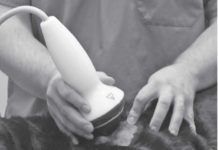Dear Doctor
Letters to the Tufts Veterinarians - A tumor in a testicle; Veterinary Information Network; Which food is right for my puppy?
Dear Doctor: What Dogs See
I've always understood that dogs don't see as many colors as people, or don't see colors as brightly, but I read recently that they have ultraviolet vision and can see colors that aren't even on our radar. How can both things be true?
Your Dog on a Ventilator
When we suggest to clients that their dog should go on a ventilator, theyll often ask, Doesnt that mean the prognosis is really bad? says Tufts emergency and critical care veterinarian Armelle de Laforcade, DVM. And the truth is, she adds, if a dog is sick enough to be on a ventilator, shes pretty sick. In fact, when we first got a ventilator years ago, we tended to put a dog on it right before she died as a last resort. So we, too, were left with the impression that it doesnt work, doesnt save lives. But we have found over time that if you think about the reasons to put a dog on a ventilator and you put her on early, it really is a useful tool to carry her over until she recovers from a bodily insult.
An Out-of-Body Experience to Fix a Dogs Shoulder
Youve no doubt heard the term rotator cuff. It applies to dogs as well as people and refers to the fact that the shoulder joint is supported by a cuff of muscles. If those muscles are torn, stretched, or otherwise compromised, moving the shoulder can cause great pain. And fixing the problem requires patience. In a person, for example, wearing a sling might be required for weeks to months, especially if there has been surgery to repair the injured muscle. The patient may not even be allowed to lift a glass of water because the muscle tissue, still weak, can tear all over again.
Staging the Cancer Helps Determine Outcome, Too
As Tufts researchers work to develop a scoring system to help determine whether a splenic mass is a deadly cancer or a highly curable hematoma before the owner makes a decision to have surgery performed, they have also confirmed that the prognosis for dogs with hemangiosarcoma is tied closely to the cancers stage. When veterinarians talk about a cancer being stage 1, 2, or 3, they are referring to where the cancer is in the body. (Grading a cancer, on the other hand, is about what the disease looks like under a microscope.)
The immediate cause of death
Benign hematoma or deadly cancer, what most commonly leads to death around the time of the operation in the 8 percent of dogs who die in the hospital is either bleeding in overdrive or clotting in overdrive. If theres bleeding in overdrive, its not just in the spleen but also all over the body. The bleeding at the site of the spleen consumes the dogs clotting factors in an all-out effort to staunch the flow of blood, so the dog now becomes prone to bleeding in other areas of the body. Its called coagulopathy.
Inroads to Better Treatment of a Common, Deadly Cancer
One of the most common things we see is dogs who are brought in with splenic masses, says John Berg, DVM, a Tufts veterinary surgeon with a particular interest in certain types of cancer. Hes talking about masses that develop in the spleen, the abdominal organ (in both dogs and people) whose major function is to store emergency supplies of red blood cells as well as other components of blood. And the masses Dr. Berg is talking about can be huge - volleyball-size, he notes.
If Franklin Can Do It, Any Dog Can
They said it couldnt be done. Okay, we said it couldnt be done - me, my wife, and Franklin. Soon after Rosies arrival when Frankie was already three years old, he starting packing on the pounds, going from a svelte 49 pounds to a rather astounding 74 in the course of just a couple of years. And there appeared to be no turning the tide.
Often-Missed Nuts and Bolts of Weight Management
Your dog cant go to the fridge for a nosh if hes bored or rummage through the kitchen cabinets to see if theres anything good to eat in the house. That is, how much your dog eats and whether he maintains a healthy weight or becomes overweight is entirely in your hands. Thats a lot of responsibility, but it also completely empowers you to make sure your dog stays trim enough to be as active, pain-free, and happy as he can.
Dog Has Different Sized Pupils
I noticed that the pupils of my Siberian huskys eyes were uneven. The right one was constricted almost to a pinpoint while the left was fully dilated! I immediately took him to my veterinarian. After the exam, I was told that in some dogs this was somewhat common and not to worry because my dog showed no signs of neurologic upset. After a while the pupils evened out. There was no change in his personality, appetite, or anything else. Your thoughts?
When Blood Flows Where It Shouldnt
Think shunt, and perhaps a medical solution comes to mind, as in a shunt implanted in the brain that allows fluid to drain and thereby decrease swelling in that organ. A cardiac bypass is a shunt, too. Its a new route for blood to flow from one part of the body to another when the old route is blocked and needs to be gotten around. In medical terms, a shunt is simply a passageway that allows the movement of fluid from one part of the body to another.
12 Pre-Exam Questions to Think Through
When you bring your dog to the veterinarian for his annual or semi-annual exam, the doctor may very well ask you whether there have been any changes in your pet since his last visit. But the phrase any changes is rather vague, and besides, sometimes changes come so gradually that theyre hard to detect until they have become quite dramatic. Thats why paying attention to your dogs habits and lifestyle variations is critical in advocating for his continued good health. As we frequently say, you are the most important partner on your dogs health care team, the one who is most intimately familiar with his day-to-day life and therefore in the best position to make the first clinical assessment about whether something might be amiss.
This becomes particularly important as your dog reaches over from middle age into his geriatric years. Noticing changes in his behavior or demeanor that you can bring up to his doctor may help you stave off illness - or treat it at the outset, when its easier to keep symptoms in check and sometimes even reverse a health problem. Treating a disease at the outset rather than after it is far gone tends to be much less expensive as well.
This becomes particularly important as your dog reaches over from middle age into his geriatric years. Noticing changes in his behavior or demeanor that you can bring up to his doctor may help you stave off illness - or treat it at the outset, when its easier to keep symptoms in check and sometimes even reverse a health problem. Treating a disease at the outset rather than after it is far gone tends to be much less expensive as well.











